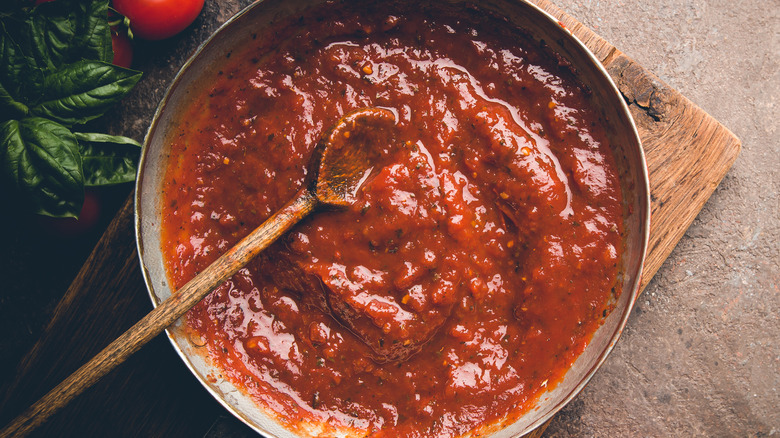Why It's Important To Let Your Pasta Sauce Simmer
Whether it's a labor-intensive Sunday sugo or a jar of ready-made sauce, simmering is fundamental. Rather than rush through the pasta process, slowing things down and giving your sauce some time to rest can make a world of difference for one key reason.
Though cooking can reduce the amount of vitamin C found in tomatoes, Cornell Chronicle reports that heat instead increases levels of lycopene, which can minimize the risk of heart disease and even cancer. So, if the sound of antioxidants make the idea of a bubbling tomato sauce all the more inspiring, it's time to get cooking!
Since tomatoes are at the core of every classic red sauce, selecting the best cans of crushed or puréed fruit can ensure a good base. Beyond that, Food52 shares that a pot of sauce can be elevated by sautéeing aromatics, sprinkling in spices, adding an anchovy, or stirring in pasta water. But nothing beats a slow simmer.
Simmer for richer flavor
It's likely that you won't have hours to spare when preparing a weeknight pasta. However, there is something to be learned from the Italian nonna that devotes an entire morning to crafting the perfect sauce.
Low and slow, Bon Appétit confirms that the reason why a simmered sauce is so darn delicious is because it allows water to cook off, concentrating the umami-packed flavors of the tomatoes and balancing the levels of sugar and acidity in the sauce. The technique also builds complexity. Serious Eats explains that if you really let it rip, the sugars break down and caramelize, while proteins undergo the Maillard reaction, resulting in a more aromatic and flavorful sauce.
Turning from thin and crimson to thick and ruby red, it's true that a homemade ragù can benefit from hours of simmering, so long as the sauce doesn't fully dry out. However, Southern Living shares that taking just 15 to 30 minutes to simmer a store-bought sauce can still do wonders. Test it out tonight and taste the difference yourself!

